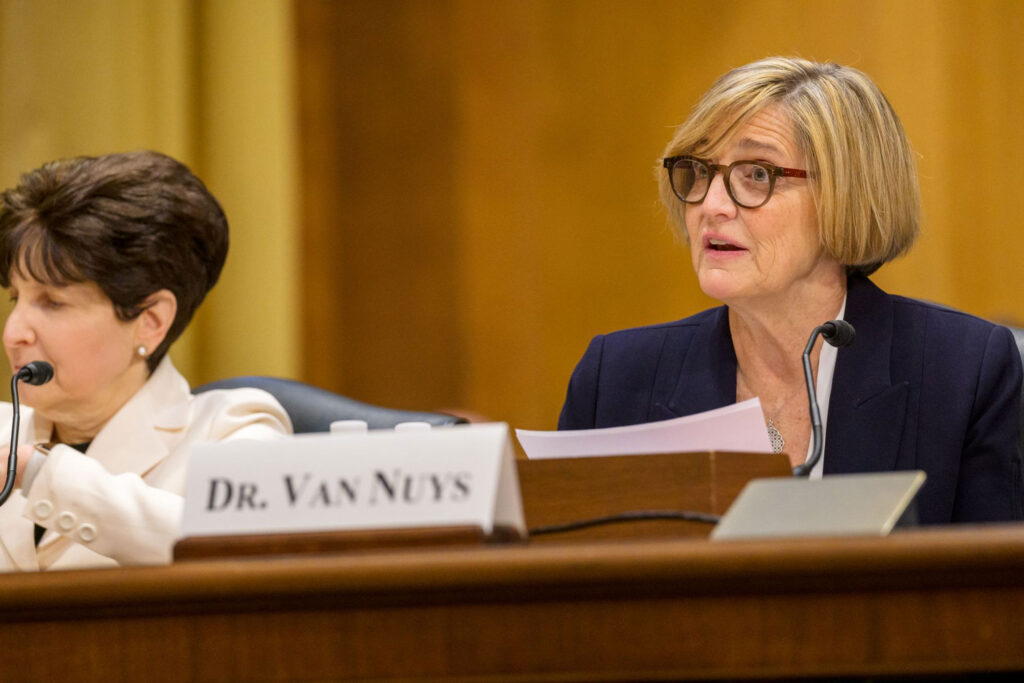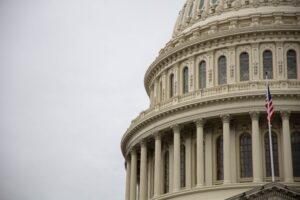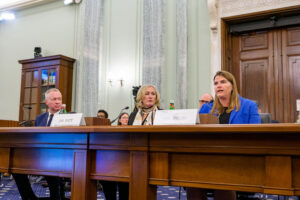The Senate Finance Committee focused on the need for increased transparency in the pharmaceutical distribution system Thursday (3/30) during a hearing on pharmacy benefit managers, their role in the prescription drug supply chain and its impact on patients and taxpayers.
Karen Van Nuys, senior fellow and executive director of the Value of Life Sciences Innovation Program at the USC Schaeffer Center, testified at the hearing, and called transparency “an essential first step.”
“It gives researchers like me, and regulators like the federal government the opportunity to understand the bigger picture” she said. “But more importantly, transparency is going to provide participants in the markets with information about the true prices that they are facing and when they have [that] information, they can make better economic decisions.”
Van Nuys was part of a panel of expert witnesses called before the committee, which is considering legislative solutions to improve access to prescription drugs, reduce costs at the pharmacy counter and shed light on the system.
PBMs: a black box at the heart of prescription transactions
Historically, pharmacy benefit managers helped hold down drug costs by negotiating with pharmaceutical manufacturers on behalf of health plans. But in recent years, vertical integration and consolidation trends have resulted in PBMs acquiring the ability to suppress competition, capture excess returns and raise drug costs.
“It’s increasingly apparent that PBMs are using their data, market power, and know-how to keep prices high and pad their profits instead of sharing the benefits of the prices they negotiate with consumers and the Medicare program,” said Finance Committee Chairman Ron Wyden (D-OR).
Questions from the committee largely focused on this point, highlighting the bipartisan nature of the drug pricing issue and questions about PBM reforms in an otherwise polarized Congress.
Van Nuys and Jonathan Levitt, founding partner of Frier Levitt Attorneys at Law, were asked by Ranking Member Mike Crapo (R-ID) what steps should be taken to increase transparency.
Levitt pointed to the need for a rebate safe harbor, which would allow PBMs to earn a fixed profit on prescription transactions, but it would be limited. Van Nuys suggested that data from a Medicare-administered aggregate pricing series could show the reimbursements pharmacies are receiving from PBMs for each prescription filled and the amount health plans are paying their PBMs to settle claims.
“If we had similar benchmarks and measures at those points in the distribution system, [they could be used] in business negotiations…and regulators could know more about how prices are moving throughout the system,” said Van Nuys.
Another expert witness, Dr. Matthew Gibbs, the president of PBM start-up Capital Rx, agreed. “We are using [the Average Wholesale Price] index everywhere – Medicare, Medicaid, commercial – and it literally has nothing to do with the price of a drug… we don’t buy any products like that in our economy and we have accepted it in the drug business.”
Sen. Chuck Grassley (R-Iowa) noted that the judiciary and commerce committees were considering legislation regarding PBM practices and that the Federal Trade Commission had launched an investigation. He said that it is policymakers’ duty to shed light on this issue.
“The only clear thing about it is how unclear and opaque it is,” said Crapo. “Policymakers need more line of sight into the black box of drug pricing relationships and transactions, especially as we look to pursue productive reforms in the future.”
Lack of transparency hurts consumers
Sen. Debbie Stabenow (D-MI) noted that there has been progress for consumers in banning gag clauses, in which PBMs had forced pharmacists not to reveal cash prices for drugs, and in bringing down insulin prices. But the high list prices that result from negotiations between PBMs and manufacturers continue to hurt patients, she said.
“When PBMs channel patients into higher priced drugs, the prices rise for everyone in the system. Fair and efficient markets don’t work that way. Patients should be encouraged to buy the drug with the lower sticker price,” said Robin Feldman, Arthur J. Goldberg Distinguished Professor of Law UC College of the Law, San Francisco.
Wyden and Sen. John Cornyn (R-TX) noted that a study in JAMA Internal Medicine authored by Schaeffer experts shows that Medicare would have saved $2.6 billion in 2018 on just 184 drugs if they had been purchased without insurance at Costco.
Lawton Burns, James Joo-Jin Kim Professor of Health Care Management at the University of Pennsylvania Wharton School, pointed to the useful interaction and incentives between health plans and PBMs. But there was consensus that patients who need prescriptions are hurt regardless.
Sen. Bill Cassidy (R-LA) pointed to formulary decisions made by PBMs, and Wyden said “this sounds like a bad news discussion for patient costs.”
Van Nuys’ full testimony can be found here and information about the hearing can be found here.
Sign up for Schaeffer Center news
Related Work
-
Data Visualization
Untangling the Price of Insulin




